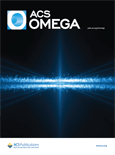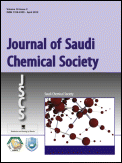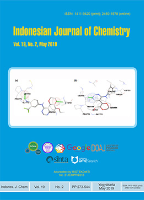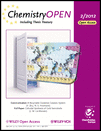
ACS Omega
Scope & Guideline
Exploring Boundless Frontiers in Chemical Research.
Introduction
Aims and Scopes
- Interdisciplinary Research:
The journal emphasizes interdisciplinary approaches, integrating chemistry with biology, materials science, and engineering to address complex scientific challenges. - Innovative Materials and Nanotechnology:
A core focus is on the synthesis, characterization, and application of novel materials, particularly nanomaterials, in areas such as catalysis, energy storage, and drug delivery. - Environmental Chemistry:
Research addressing the environmental impact of chemical processes and the development of sustainable practices, including waste management and pollution remediation, is prominently featured. - Biochemistry and Medicinal Chemistry:
The journal publishes studies related to drug discovery, medicinal chemistry, and the biochemical mechanisms underlying health and disease, highlighting the role of chemistry in biomedicine. - Computational Chemistry:
A significant portion of articles involves computational modeling and simulations, providing insights into molecular interactions, reaction mechanisms, and material properties. - Analytical Chemistry:
Research in analytical methods and techniques for detecting and quantifying chemical substances is a key area, supporting advancements in various scientific fields.
Trending and Emerging
- Sustainable Chemistry and Green Technologies:
Research focused on sustainable practices, renewable resources, and eco-friendly chemical processes is gaining momentum, driven by global calls for environmental responsibility. - Machine Learning and Artificial Intelligence in Chemistry:
The integration of AI and machine learning techniques in chemical research is on the rise, facilitating data analysis, predictive modeling, and enhanced research methodologies. - Biomaterials and Tissue Engineering:
There is a growing interest in developing biomaterials for medical applications, particularly in tissue engineering and regenerative medicine, reflecting advances in healthcare. - Nanomedicine:
Studies exploring the use of nanotechnology in medicine, particularly for drug delivery and diagnostics, are increasingly popular as they offer innovative solutions for complex medical challenges. - Electrochemical Energy Storage and Conversion:
Research in electrochemical systems, including batteries and supercapacitors, is trending upward as the demand for efficient energy storage solutions grows. - Photocatalysis and Light-Driven Reactions:
The exploration of photocatalytic processes for environmental cleanup and energy conversion is emerging as a key area of research, aligning with efforts to harness renewable energy.
Declining or Waning
- Traditional Organic Synthesis:
There has been a noticeable decrease in papers focusing solely on traditional organic synthesis methods, as researchers increasingly explore more innovative and efficient synthetic pathways. - Basic Inorganic Chemistry:
Research centered on fundamental inorganic chemistry has waned, possibly due to the growing focus on applied research and materials science. - Conventional Environmental Studies:
While environmental chemistry remains a focus, traditional studies lacking innovative approaches or interdisciplinary collaboration are less frequently published. - Single-Discipline Studies:
Papers that do not incorporate interdisciplinary perspectives or applications are facing reduced acceptance, as the journal moves towards more integrative research. - Low-impact Studies:
Research that does not demonstrate significant practical applications or advancements in the field may be declining, as the journal prioritizes impactful contributions.
Similar Journals

Chemical Methodologies
Unlocking the Potential of Chemical MethodologiesWelcome to Chemical Methodologies, a premier journal published by SAMI PUBLISHING CO-SPC, dedicated to advancing the field of chemistry through innovative research and methodologies. With an ISSN of 2645-7776 and an E-ISSN of 2588-4344, this journal provides a vital platform for researchers and scholars to share their findings in areas encompassing physical, theoretical, and organic chemistry. Despite its initial HIndex and quartile rankings still being established, the journal's evolving impact within the academic landscape is underscored by its Scopus Ranks, which place it in the 35th percentile for physical and theoretical chemistry and the 33rd percentile for organic chemistry. Since its inception in 2022, and continuing through 2024, Chemical Methodologies aims to foster collaboration and knowledge dissemination among academics and practitioners alike, bridging theoretical concepts and practical applications. This open-access platform enhances accessibility for researchers and students worldwide, ensuring that groundbreaking contributions to chemical science reach a broad audience.

Journal of Saudi Chemical Society
Advancing Chemistry Knowledge, One Article at a Time.The Journal of Saudi Chemical Society, published by ELSEVIER, stands as a premier platform for advancing knowledge in the field of chemistry. Since its inception in 2009, this Open Access journal has garnered significant attention, securing a prestigious Q1 ranking in the Chemistry (miscellaneous) category for 2023, reflecting its position among the top journals in the discipline. With an impressive Scopus ranking of #66 out of 408 in General Chemistry, this journal boasts a commendable 83rd percentile, underscoring its impact and relevance in the global research community. The journal aims to disseminate high-quality research articles, reviews, and case studies, fostering innovation and collaboration among chemists and allied professionals. By enabling widespread access to cutting-edge research, the Journal of Saudi Chemical Society plays a crucial role in supporting the educational and professional development of students, researchers, and practitioners alike, making it an essential resource for anyone invested in the dynamic field of chemistry.

Moscow University Chemistry Bulletin
Empowering the Next Generation of ChemistsMoscow University Chemistry Bulletin is a distinguished academic journal dedicated to advancing the field of chemistry, published by PLEIADES PUBLISHING INC. With an ISSN of 0027-1314 and an E-ISSN of 1935-0260, this journal provides a platform for researchers, professionals, and students to explore a wide range of topics in general and specialized chemistry. While it holds a current Q4 ranking in the “Chemistry (miscellaneous)” category according to Scopus, the journal is committed to broadening its scope and visibility, aiming for greater impact in the global scientific community. Moscow University Chemistry Bulletin focuses on the publication of cutting-edge research, reviews, and discussions that stimulate innovation and collaboration. Although it is not an Open Access journal, it plays a crucial role in disseminating knowledge and fostering academic dialogue within the field, as it converges towards significant findings from 2004 to 2024. The continuous development of its content holds the potential to attract a diverse readership, making it a valuable resource for those involved in the chemical sciences.

Indonesian Journal of Chemistry
Fostering Collaboration: Where Ideas Ignite Chemical InnovationIndonesian Journal of Chemistry (ISSN: 1411-9420), published by Gadjah Mada University, Department of Chemistry, is a premier platform for disseminating innovative research and advancements in the field of chemistry. Established as an Open Access journal since 2001, it promotes wide accessibility to high-quality scholarly articles, fostering collaboration and knowledge-sharing among researchers, professionals, and students in Indonesia and beyond. With an impact factor that places it in Q3 among miscellaneous chemistry journals and a Scopus ranking reflecting its emerging influence (Rank #248/408, 39th Percentile), the journal plays a significant role in enhancing the academic landscape of chemistry. Spanning diverse themes within the discipline, it invites contributions that bridge theoretical and practical aspects, thus contributing to the global conversation on chemical research and innovation. Located in Yogyakarta, Indonesia, the journal reflects a commitment to advancing scientific inquiry while addressing local and global challenges in chemistry.

Applied Chemistry for Engineering
Advancing Knowledge for Real-World ApplicationsApplied Chemistry for Engineering, published by the Korean Society of Industrial and Engineering Chemistry, is a vital resource for researchers and professionals engaged in the realms of chemical engineering and applied chemistry. With an ISSN of 1225-0112 and an E-ISSN of 1228-4505, this journal serves as a platform for innovative research that spans diverse applications within these fields. Although currently not classified under open access, it provides critical insights and advancements to its audience, contributing to the ongoing discourse in the industry. The journal's significance is underscored by its rankings in Scopus, where it resides in the Q4 category for both Chemical Engineering and Chemistry, evidencing its commitment to publishing relevant studies despite its emerging status. As it continues to grow through the converged years from 2007 to 2024, Applied Chemistry for Engineering aims to bridge the gap between theoretical research and practical engineering solutions, making it an essential tool for students, researchers, and professionals alike.

CHEMICAL JOURNAL OF CHINESE UNIVERSITIES-CHINESE
Exploring the Depths of Chemical Knowledge.CHEMICAL JOURNAL OF CHINESE UNIVERSITIES-CHINESE, published by Higher Education Press, serves as a vital platform for advancing research in the field of chemistry. With a history dating back to 1996, this journal has evolved to encompass a wide range of topics fundamental to the chemistry community, catering to both applied and theoretical perspectives. Although classified in Quartile 4 within the broader chemistry category, it remains a significant contributor to the knowledge base, ranking 281st out of 408 journals in the general chemistry category according to Scopus. Positioned in Beijing, China, the journal aims to foster collaboration among researchers and professionals while disseminating innovative research and developments. By promoting open exchange of ideas in chemistry, it strives to elevate the scholarly dialogue and contribute to ongoing education for students and professionals alike, with its content accessible through institutional subscriptions.

ChemistryOpen
Empowering Research Through TransparencyChemistryOpen is a leading open access journal published by WILEY-V C H VERLAG GMBH, dedicated to advancing the field of chemistry. With its ISSN 2191-1363, this journal has been a vital platform since its inception in 2012, promoting unrestricted access to innovative research findings and critical reviews in various chemistry domains. As a testament to its growing influence, ChemistryOpen has achieved a commendable Q2 quartile ranking in the 2023 Chemistry (miscellaneous) category, which highlights its quality and impact within the academic community. Researchers, professionals, and students benefit from the journal's commitment to making high-quality research accessible, facilitating knowledge transfer and collaborative insights among chemists worldwide. The journal's transparent open access model ensures that groundbreaking discoveries and methodologies are readily disseminated, fostering a culture of innovation and interdisciplinary dialogue in the ever-evolving landscape of chemistry.

Journal of the Iranian Chemical Society
Fostering Collaboration for a Brighter Chemical FutureThe Journal of the Iranian Chemical Society, published by SPRINGER, is a prominent academic journal dedicated to advancing the field of chemistry. With an ISSN of 1735-207X and an E-ISSN of 1735-2428, this quarterly journal has been contributing valuable research from 2006 to 2024. Situated in Germany, it serves as a vital platform for chemists and researchers to disseminate their findings, particularly within the miscellaneous chemistry category, where it ranks in the Q3 quartile for 2023. Despite its current lack of open access options, the journal maintains a solid presence in the academic community, evidenced by its Scopus ranking of #165 out of 408 in general chemistry and a commendable 59th percentile. The journal's objective aims to foster innovation and collaboration in chemical research, making it an essential resource for professionals and students keen on pioneering developments in the field. As a subscriber, you will gain insights into cutting-edge research that drives the future of chemistry.

Eurasian Chemico-Technological Journal
Connecting Researchers for a Greener, Smarter TomorrowEurasian Chemico-Technological Journal, published by the Institute of Higher Education Academy of Sciences in Kazakhstan, serves as a dynamic platform for scholars and professionals engaged in the interdisciplinary fields of chemical engineering, chemistry, condensed matter physics, and materials science. Since its inception in 1999, the journal has embraced an open access model, enabling broad dissemination of research findings and fostering collaborative innovation across borders. With an ISSN of 1562-3920 and a converged publication schedule extending from 2007 to 2024, it continues to contribute to the global academic dialogue, despite its current standing in Q4 quartiles across several categories on Scopus. The journal ranks in the lower percentiles within its respective fields, yet it remains a valuable resource for emerging research and perspectives within the scientific community. This journal is essential for both seasoned researchers and students, as it reflects the evolving landscape of chemico-technological research while promoting engagement with contemporary issues in the sciences.

Physical Chemistry Research
Empowering global access to pioneering physical chemistry findings.Physical Chemistry Research, published by the Iranian Chemical Society, is an esteemed academic journal dedicated to advancing knowledge within the fields of *Fluid Flow and Transfer Processes*, *Physical and Theoretical Chemistry*, and *Statistical and Nonlinear Physics*. Since its inception in 2013, the journal has established a crucial platform for researchers, professionals, and students to share innovative findings and methodologies, enhancing collaboration and knowledge dissemination in the physical chemistry community. With impactful contributions recognized in Quartile 3 and Quartile 4 classifications across various categories, the journal is positioned to cultivate emerging research trends as it continues to converge through 2024. Researchers can benefit from diverse perspectives on crucial phenomena in physical chemistry, as the journal is indexed in prominent databases, further increasing accessibility and visibility. The *open access* policy ensures that cutting-edge research remains available to a broad audience, promoting the growth of the discipline globally.